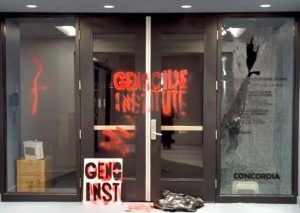For European Jews, living in the former Dutch colony of Suriname provided numerous benefits over the years. In the early days of the colony on the Atlantic shore of South America, it meant escape from the Spanish Inquisition and a place of refuge for Sephardi Jews. But during World War II, ties to the home country of Holland proved fatal for 105 members of the community.
When war broke out, 15 per cent of the community’s 700 residents were abroad – doctors, dentists, businesspeople and others – attending universities or other schools of higher education. They were caught up in the Nazi onslaught and murdered.
On March 18, a memorial was unveiled to commemorate the slain members of the community. The name of each is inscribed in stone, including date of birth, as well as date and place of death.
READ: HATE IS NEVER RIGHT, AND LOVE IS NEVER WRONG
Government dignitaries, diplomats, representatives of other religions and others joined the Jewish community as it unveiled the memorial monument.
The memorial – matzevah in Hebrew – is located in the courtyard of the Neve Shalom Synagogue in Paramaribo, the capital city. Rectangular and made of imported granite, it was designed by local architect Philip Dikland. Its $13,000 (US) cost was funded by donations from the Jewish American Society for Historic Preservation and 45 people in the United States, Australia, Canada, Suriname and Holland, along with help from the Canadian Friends of Kulanu, a Toronto non-profit group.
The community itself, which played an important role in the country’s early history and plantation economy, did not have the financial means to fund the memorial on its own, explained Jacob Steinberg, an Israeli-born Toronto financial consultant.
Steinberg, whose work for a gold mining company took him to Suriname for 2-1/2 years, considers himself part of the Surinamese community, even though he now lives in Richmond Hill, Ont. When he moved to the South American nation, “I didn’t know there were Jews in Suriname,” he said.
The community’s history dates back to the 1630s, when Jews of Portuguese descent arrived from northern Brazil. Further migrations followed. In 1669, they were given special privileges allowing them to establish their own community, known as the Jewish Savannah, as well as freedom of religion, the right to operate a court of justice and their own civil guard.
Steinberg returns to the country periodically and has assisted the community in various endeavours, including raising more than $100,000 (US) to clear three cemeteries and erect an iron fence around them.
Lilly Duym is grateful for his assistance. Contacted by phone in Suriname, she said the 200-strong community had for some years hoped to erect a monument, but did not have the means to do so. Its demographics trend to the elderly, and there are only eight children under the age of 12. Over the years, most Jews left for Holland, she said.
Asked to help with the memorial, Steinberg at first was at a loss on how to proceed. He approached a local contractor who’d helped with the cemetery project. He referred him to Dikland, the architect, who agreed to build the monument at cost.
When he told community president Jules Donk what the price would be, Donk responded, “God has his ways.”
Donk proved to be right. After he returned to Canada, Steinberg received calls out of the blue from Jerry Klinger, an American who was interested in preserving small Jewish communities and had seen Steinberg’s name on a website about the Surinamese community. Hearing of the project, Klinger agreed to contribute $4,000.
READ: SOME POGROMS WERE ABOUT POLITICS, NOT ANTI-SEMITISM – PROF
A few days later, Steinberg heard from a stranger in Boulder, Colo., who sent a cheque for $2,800 for the project.
Donations continued to arrive, including some from a group of 140 people called the “Chai Membership,” who had assisted Steinberg in his earlier efforts to help the Surinamese community.
With the co-operation of Yad Vashem, which added to the known list of Surinamese Shoah victims, the project proceeded. Duym said the unveiling helped educate the broader Surinamese population about a little-known aspect of the Jewish community’s history. “The Surinamese people did not know what was going on at that time,” she said. “It was very important for us to tell the whole world – all the communities, all the religious groups – that our people were also murdered,” she said.






